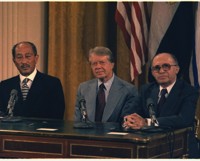Between 1948 and 1973, Egypt and Israel fought four major wars and a collection of smaller skirmishes. Some of these conflicts -- the Suez Canal crisis, the Six-Day War of 1967 and the October or Yom Kippur War of 1973 -- had geostrategic implications for the United States. Any of them conceivably could have escalated into a confrontation between the two Cold War-era superpowers. And throughout that period, a strong, aggressive Egypt represented the gravest threat to the security of the state of Israel, which had become a vital U.S. interest in the Middle East.
For all these reasons, and many more, the Camp David peace accords that in 1978 brought an end to the wars between Israel and Egypt are an unambiguous triumph of American diplomacy. Although the accords first and foremost required political courage from the Israelis and Egyptians, the United States can take credit for shepherding the agreement and then enabling its implementation through the years. Today, though, Americans do not fully appreciate the absence of war between Israeli and Egypt or the effort required on the part of U.S. policymakers to protect what has often been described as a “cold peace.”
Last week, for example, Tom Friedman, arguably the foremost American pundit on global affairs, suggested in the pages of the New York Times that the millions of dollars in scholarships the United States provides annually to Lebanese college students is a more valuable national security investment than the $1.3 billion in annual military aid the United States provides to the Egyptian military.

